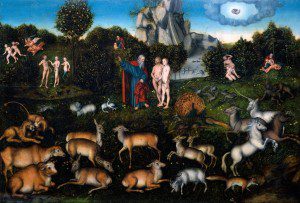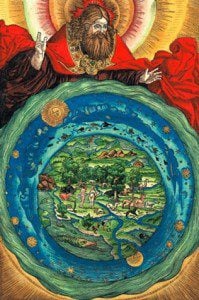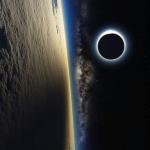 There is a fundamental difference between the biblical stories of creation in Genesis 1 and in Genesis 2 and the secular materialist narrative common in our modern Western culture. Justo González emphasizes this his short book [Creation] The Apple of God’s Eye. Although there are two stories of creation in Genesis 1-2, with details that cannot be neatly harmonized, the stories agree on the important theological points of overlap. Most significantly, they agree that humankind, male and female, is the culmination of creation.
There is a fundamental difference between the biblical stories of creation in Genesis 1 and in Genesis 2 and the secular materialist narrative common in our modern Western culture. Justo González emphasizes this his short book [Creation] The Apple of God’s Eye. Although there are two stories of creation in Genesis 1-2, with details that cannot be neatly harmonized, the stories agree on the important theological points of overlap. Most significantly, they agree that humankind, male and female, is the culmination of creation.
In the first story, humankind is created on the sixth day, after which God rests. In the second, the man is created first, then the plants and the animals – which are created in order to provide company to the man, but are not able to achieve that goal – and finally the story culminates in the creation of woman. (p. 33)
Even more to the point we see the value of humankind as the culmination of creation in Genesis 1 and 2 through the incarnation. “Jesus is not only God’s response to sin, but the culmination of creation.” (p. 37) The Son puts on human flesh, being born of woman. González digs into the incarnation a little in this discussion. There has been some debate in the church as to whether the incarnation is solely the remedy for sin, or whether incarnation was always part of God’s plan for creation. The story of creation-fall-redemption-culmination has often led Christians to conclude that without sin there was no need for the incarnation. This isn’t the sole view, however, and probably isn’t the correct view.
For Irenaeus [second century theologian], and for many other Christians then and through the ages, God always intended for creation to develop, for humans to till the earth and build cities, and eventually become closely united with God. In this Christian tradition, quite ancient and often forgotten, the incarnation of God in Jesus is not only a response to sin, but also the culmination of creation, the point for which all creation was made and toward which creation is moving. (p. 37)
It is significant that God puts on human flesh when and where the time was right. Humankind, male and female, are not accidents of evolution. Nor are they merely another kind of animal. Humans were created in the image and likeness of God to care for the earth (the garden in Genesis 2) and to be God’s representatives on the earth. The incarnation puts to rest (or should put to rest) any dismissal of the flesh as degrading and humankind as insignificant.
 Created for dominion with love. God said “let us make humankind in our image, in our likeness, so that they may rule …” and then tells them “be fruitful and multiply, fill the earth and subdue it.” Humans were created with a job and a purpose (also in Genesis 2 where they tend the garden). But this isn’t a license to destroy the earth. As God’s act of creation was an act of love, so human dominion over the earth should be an act of love for God’s creation. “To have dominion over the earth means that we manage the world with love, not exploit it with greed.” (p. 40) All of God’s creation is good – independent of humans and before humans were on the scene.
Created for dominion with love. God said “let us make humankind in our image, in our likeness, so that they may rule …” and then tells them “be fruitful and multiply, fill the earth and subdue it.” Humans were created with a job and a purpose (also in Genesis 2 where they tend the garden). But this isn’t a license to destroy the earth. As God’s act of creation was an act of love, so human dominion over the earth should be an act of love for God’s creation. “To have dominion over the earth means that we manage the world with love, not exploit it with greed.” (p. 40) All of God’s creation is good – independent of humans and before humans were on the scene.
Not merely animals. González points out a few other key ideas concerning the nature of humankind.
Humans are created from the dust of the earth, as are the other animals. Having dominion doesn’t makes us something other than material creations alongside the other animals of the earth. “But this isn’t all we are. Among all these animals, we seem to be the only ones that have a sense of transcendence. We can stand outside ourselves and look at ourselves.” (p. 43)
In Genesis 1 male and female are created together while Genesis 2 goes into more detail on the relationship. The woman is created from the man’s “rib” and is flesh of his flesh and bone of his bone. Although some have suggested that this puts the woman in a subservient positions, other views are possible and in fact, more probable. The woman is created as a helper, as his partner. “The intent of this story is to make clear that the relationship between the man and the woman is different from the relationship between the man and all other living things.” (p. 45) The man realizes this “and then refuses to give her a separate name – which would have been a claim of authority over her. Instead, he shares his name with her: he is ish, and she will be ishah. It is only later, after sin has intervened, that he calls her “Eve,” thus claiming power and authority over her (Gen 3:20).” (p. 45)
Humans are created to be creative. González suggests that speech is a primary indication of this.
According to the Genesis stories, humans were placed on earth to represent God’s dominion – a dominion of love.
This is why humans have the power of speech which we may use as a way to claim dominion – as man does in naming the animals. This too reflects the image of God who made all things by means of speech – or by means of the word. (p. 46)
Words have power. They shape human experience and provide the connection that builds human community and human society. Without abstract sophisticated communication, very little can be accomplished.
Human words, like God’s word, but to a much lesser degree, are powerful. Humans can use the power of their words to create – to create community, to organize society, to develop ideas, to bring them to fruition. Or, as is often the case, we can use that power to destroy, to falsify, to divide. (p. 47)
The biblical story of creation in Genesis 1 and 2 sets the stage for our understanding of who and what we are. We are vertebrates, mammals, primates, hominins in relationship with other past and present creatures of God, but we are not merely animals and certainly are not accidents of nature. The narrative is the foundation of our message. The narrative of Genesis 1 and 2 set the ancient Israelites apart from the surrounding cultures of the ancient Near East. Likewise, it sets the Christian story apart from the scientific materialism of our age. Will we live up to it?
What is the significance of the creation narrative in our culture?
How does it speak to us and keep us tuned to God’s mission in the world?
If you wish to contact me directly you may do so at rjs4mail [at] att.net.
If interested you can subscribe to a full text feed of my posts at Musings on Science and Theology.















